- Home
- Alex Berenson
The Midnight House Page 5
The Midnight House Read online
Page 5
Life was strange. If anyone had told Wyly two years ago that he’d be worrying about parking passes, he would have . . . well, he didn’t know what he would have done. Probably just laughed. Back then he’d been in the middle of the most secret war the United States had ever fought. Now he was wondering if he had enough points to join the Screen Actors Guild.
Wyly eased out of the garage and onto Lankershim. He fired a stream of dip-darkened spit into the Coke bottle in the passenger seat and plugged his iPod into the Mustang’s radio, an aftermarket addition, the only part of the car that wasn’t genuine Ford. The smooth twang of Brooks & Dunn poured from the backseat, and Wyly looked into the warm night sky. Another day done. Eight thirty-eight p.m., according to the iPod. Twelve hours’ work. With the overtime he’d made close to five hundred, pretax. Not bad.
When Wyly quit the army, he figured on staying in North Carolina, his home state. Working security in Charlotte. Then his wife, Caitlin, told him they were moving to Los Angeles. She’d always wanted to be an actress. She was twenty-four now, and if she waited any longer, she’d be too old.
Caitlin certainly had the looks. She’d been in a “Girls of the ACC” spread in Playboy five years before. But she couldn’t act her way out of a paper bag. Wyly had seen her try. He told her she would miss her family and friends; she could act in Charlotte.
No dice. She told him she’d divorce him if he didn’t “support her dream, help her reach her potentialities.” He’d always been “an avatar of failure” for her, she said. “Potentialities”? “Avatar”? Wyly didn’t even know what an avatar was, and he was sure Caitlin didn’t, either. He could always tell when she’d been talking to her sorority sisters.
He should have let the marriage come to its inevitable sorry end right then. He’d hardly seen her for two years. Still, he wasn’t ready to give up. And he figured he could work security in Los Angeles as easy as Charlotte. They could live by the ocean. He’d learn how to surf. So off to California they went.
But Los Angeles was more expensive than either of them figured. They got stuck renting in Chatsworth, the northwest corner of the Valley, a five-room house for $1,625 a month. Robbery. As for surfing, the traffic meant that they were an hour from the beach, on a good day.
To nobody’s surprise but her own, Caitlin didn’t land any gigs. To help pay the rent, she started waitressing at a restaurant called the Smoke House, by the Warner Bros. studio lot. A month later, barely three months after they moved to California, she told Wyly she was leaving. She’d met her soul mate. He made the mistake of asking Who is he? and got the dude’s résumé in return. Bart Gruber. He made the kind of movies that went right to the video store. Gruber had convinced Caitlin her career would take off if she would let the world peek at her C cups in his next movie, The Smartest Girls in the Room, something about lesbian scam artists. Even worse, Caitlin had convinced herself she was in love with him. Probably the best acting she’d ever done.
Wyly was through arguing. Thank God she hadn’t listened when he told her, that first year together, that they should have kids right away. He dragged her suitcases out of the bedroom closet.
“Careful,” Caitlin said, when he started tossing her clothes onto the bed. “A lot of that stuff is new.”
“Now I know where your money’s been going.”
“Mike. Aren’t you even going to fight for me? ”
A single tear ran down her cheek. Typical. Now that she was an actress, she wanted some drama. He almost laughed. “Fight for you. No.”
“Because you never loved me.”
“No, Cate, I loved you, best I could considering we’ve hardly seen each other. I don’t think you ever loved me. And I’m not inclined to take on a fight I’m bound to lose. But I do feel a tiny bit bad for you. You oughta marry a doctor back home, like Cindy and Sandy”—her favorite sorority sisters. “Put those tits to use before it’s too late. You’re gonna whore, get yourself paid.”
“Michael Steven Wyly. I won’t let you speak to me that way.” She hauled off and slapped him across the face. He let her. If he grabbed back, she’d probably call 911. He did not need a domestic violence charge on his back.
“Listen to me here,” he said. “I know you don’t think so, but I’m looking out for you. You wind up staying out here too long, these guys like Geller—”
“His name’s Gruber—”
“They’re gonna use you up. Go home while you still have it.”
“I love California.”
“Love. Sure. That word again. You wouldn’t know love if it gave you a hundred bucks to suck it off.” He guessed he was angrier than he knew. He’d never said anything like that to her before.
She tossed back her hair and tried to slap him again. “You’re a pig, Michael. Bart says you’re a Fascist, just like the Germans.”
Wyly felt his heart race. For a few seconds they were both quiet, and then he spoke, slowly, carefully. “This guy I’ve never met says I’m a what? Like the who? ”
“He says you and your unit, what you did to those detainees, it was criminal and you should be in jail—”
Wyly took a breath, stepped away from her so he wouldn’t do something he’d regret. They were in deep waters here. “What did you tell him about me, Caitlin? You know I don’t talk about that.” Not now, and not ever, Wyly didn’t add. He didn’t talk about it, and he didn’t think about it. Different guys had different ways of handling it. He’d decided as soon as he got out that the best way for him would be just to forget it. That plan was working pretty well so far.
“I said you were on an interrogation unit. That’s all.” She sounded defensive. Then her face hardened. “I didn’t have to tell him anything else. He says everybody knows what you did. He says we broke the Geneva convention—”
“You know what the Geneva convention is, Cate? You have any idea? ”
“He says you embarrassed the whole country—”
Ugly words went through Wyly’s mind, slurs about this guy Bart, but he didn’t say them. He wouldn’t give her the satisfaction. He summoned his Ranger discipline and kept his voice even.
“He doesn’t know what it was like over there, and you don’t, either.”
“Just like Apu Grab, Bart says.”
“You mean Abu Ghraib? You don’t have a clue.”
“I know you think I’m stupid, but I have a college degree, Michael. Unlike you.”
“Physical therapy is not a college degree. Even if NC State says it is. Tell your boyfriend we were interrogating top-level terrorists. The guys who pulled the strings. Not random Iraqi farmers who got caught in raids.”
“Just answer me one thing. If you’re so proud of what you did, how come you never talk about it? How come you always change the subject?”
And despite himself, Wyly was carried back to the barracks in Poland. He pushed the images out of his mind. Past was past. “I’m a soldier, Cate. I did what they told me, my superior officers. That’s how it works.”
“Bart said you’d say that. You were the muscle, you followed orders. He said that’s an old story.”
Wyly stepped toward her, raised his hand high. Then he turned away, grabbed a T-shirt and shorts and his running shoes. Los Angeles had a chain of gyms called 24 Hour Fitness. He’d joined a couple of weeks back. If he wasn’t going to get arrested for assault, he needed to get out of this house.
HE RAN SEVENTEEN MILES that night, stayed on the treadmill until 2 a.m. When he got home, Caitlin was gone. A month later they finalized the divorce, a quick no-fault that split their assets—the two cars and the four thousand dollars in their savings account—right down the middle. Wyly celebrated by going to Hollywood and going home with the first girl drunk enough to say yes. She didn’t have Caitlin’s body, but she was a much better lay.
A week later, he saw a posting on a military-only chat board looking for ex-soldiers to do stunts on a television show. He thought maybe the post was a scam, but he applied anyway. It was real. And he
got the job.
Now he was working regularly. Making decent money. Enough to pay the rent on the house and have a few bucks left over for this Mustang. Nothing fancy, a gunmetal-gray convertible with the six-cylinder engine. He would have liked a V-8, but he couldn’t make the math work. The odometer on this one read eighty-five thousand miles, which probably meant one hundred eighty-five thousand. It needed a little bit of work, had some rust on the right quarter panel, but nothing major.
He got a loan from the friendly bankers at Wells Fargo and picked it up for eleven-five. After a couple of weekends, he had it running smooth. Of course, it was no good for anything longer than a trip to the beach. These old engines overheated in a hurry, and the six-cylinder was underpowered by modern standards. He needed a week to go zero to sixty. But he could run it back and forth to work, and that was all he wanted.
Yeah, he couldn’t complain. California was all right. He thought about Caitlin less than he would have expected. A couple of weeks back he’d seen her at a club in Burbank, looking pissed, standing with another girl who could have been her twin. No guys around. He wondered if Gruber had dumped her already. He’d ducked out before she saw him, blown the fifteen-dollar cover. He had nothing to say to her.
Once in a while he remembered what Caitlin had said to him on their last night together. No, he couldn’t say he was proud of everything 673 had done. Especially at the end. But he was done now. He lived in the Valley and played drill sergeant to overpaid actors, none of whom cared about his time in the army. If they asked, he said, “Yeah, I was a Ranger.” People in Hollywood preferred to talk about themselves anyway, so most of the time he didn’t need to say anything else. On those rare occasions when somebody pushed him for details, he’d say, “I wish I could tell you. But it’s all classified. Maybe in fifty years.”
WYLY STOPPED at an In-N-Out Burger, thinking he’d refuel, then head out to one of the bars near his house, have a beer, watch the end of the Lakers game. While he was waiting to order, he changed his mind. He was eating too much junk these days. He’d noticed this morning that he’d gained a couple of pounds. Out here, that mattered. Being an ex-soldier wasn’t enough. He needed to look the part.
He pulled out of line, headed home. He had a date tomorrow night, a nurse he’d picked up at a Starbucks the week before. Girls out here were easy. He was pretty sure that if he paid for dinner and half listened to whatever she told him, they’d wind up back at her place. Playing doctor. Though he better not make that joke. He’d tried it with another nurse a month back. She hadn’t laughed.
At the Safeway on De Soto, he picked up a premade salad and low-fat turkey. The guys he’d served with would be laughing. So be it. If everything went right, in a year or two he might start getting regular acting gigs. He could deal with a few tasteless dinners.
Chatsworth was a dull middle-class neighborhood, built in the 1960s and 1970s as Los Angeles expanded into the northern end of the Valley. Houses here were packed tightly on small lots, separated by walls or hedges for privacy. Wyly made a left onto Lassen, a right onto Owensmouth, another left and right, the streets getting shorter and shorter, and finally swung into his driveway. The place had two narrow bedrooms, a galley kitchen, and a living room that barely fit a couch and a coffee table. Wyly didn’t mind. After living for years in army housing, and then that barracks in Poland, he was just glad to have a place of his own.
He caught the very end of the Lakers game, then flipped on ESPN. At about 11:30, he was watching SportsCenter, nursing a Corona Light, and slapping mustard on the low-fat turkey to make it go down easier, when the doorbell rang.
“Yeah,” Wyly yelled. “Who’s there? ”
“Domino’s.”
Wyly hadn’t ordered any pizza. A month before, Pizza Hut made the same mistake. Maybe someone was pranking him. But as a prank, ordering pizza for someone was lame. The Pizza Hut guy left, no argument, when Wyly said he hadn’t ordered it.
“Not mine,” he said. He pulled open the door, saw the Domino’s box—
And then his stomach was torn in half. The pain was worse than the worst punch he’d ever taken, not just his skin or his abs but tearing deep into his gut.
“Oh, God,” he said. He dropped his beer and stumbled backward. His upper body jackknifed, closed on itself, as he instinctively tried to protect the wound. He put his right hand to his belly and felt blood, his own blood, trickling through his fingers. Barely a second had passed. Wyly didn’t understand exactly what was happening, much less why it was happening, but he knew he was in trouble.
Wyly tried to raise his arm to defend himself, though he felt the power leaving his legs. In a few seconds, he’d be on the floor—
“No—” he said. “Ple—”
He didn’t even get to beg. The second shot caught him higher up, breaking two ribs and tearing into his right lung. His muscles collapsed. He went down hard, no acting job, no slow-motion fall into the beer puddling on the clean wood floor. No noise from the shots. A silencer. The gun, the pistol, hidden under the Domino’s box. Wyly got that much but no more. He understood the how, but not the who or the why. Wyly tried to raise his head and look at the shooter, the killer, since he knew now that he was dying, would be dead very soon.
Then the pistol spoke its lethal whisper twice more. Wyly twitched and died. Behind him, the ESPN anchors introduced SportsCenter’s top ten plays of the day.
THE SHOOTER SLIPPED the pistol, silencer still attached, into the empty pizza box, and pulled the door shut and walked to the Toyota in the driveway and slipped inside. And the car rolled out and disappeared into the blurry Los Angeles night.
4
BERLIN, NEW HAMPSHIRE
Don’t take your guns to town. . . .”
Wells was pulling himself up a steep rock face, when Johnny Cash’s voice erupted from his cell phone. The dream left him, and he found himself in his cabin. He couldn’t remember why he’d been climbing, or what waited for him at the peak. He squeezed his eyes, hoping to recover the mountain. But the phone kept ringing—or, more accurately, singing—until Wells swept an arm across the bedside table and grabbed it.
“Hello.” The word stuck in his throat. His tongue seemed glued to the roof of his mouth. His pulse hammered in his skull, a metronome gone mad. He wondered how much he’d drunk the night before. Three beers, a couple shots. Hadn’t seemed like all that much. He supposed he wasn’t used to drinking.
“I wake you? ” Shafer sounded amused. “Long night, John? ”
Wells lifted his head, an inch at a time, peeked at the clock by the bed: 12:15. He hadn’t slept past noon in at least twenty years. Then he remembered the martini. The martini had done him in. Anne had ordered it for him at last call, over his protests. Shaken not stirred, she’d told the bartender. Then she’d winked at him. He’d wanted to be irritated, but the truth was he’d been flattered. He’d told her who he was two beers before. She was twenty-nine, a cop in Conway, divorced two years before and remaking her life. She seemed amused that he’d wound up in a cabin in New Hampshire.
“Shouldn’t you be in the other Berlin? Chasing Russians? ”
“The cold war’s over, sweetheart.” Sweetheart said like a 1950s movie star.
“Germans, then. Back in high school, I wanted to go to Berlin, see the Love Parade.”
“That big rave? ”
“That big rave. I read about it, and it sounded like the coolest thing ever. Remember, I was sixteen. Instead, I got stupid, fell in love, married Frank Poynter, and now look at me. Stuck in a bar with a guy pretending to be John Wells.”
“I am John Wells. At least I think I am.”
“Sure you are. I bet you run this scam all the time.” She laughed and kissed him. Even before the martini, they both knew she was going back to the cabin.
“WHAT DO YOU WANT, ELLIS?”But he knew, without knowing, what Shafer wanted. This call was overdue. He ignored the jackhammer in his skull and sat up. Anne reached out, ran a hand down his back.
“I want you,” Shafer said. “Your presence is requested down here.”
“Mmmph.”
“Soon as possible. If you can tear yourself away from your social obligations.”
Wells didn’t bother asking how Shafer had guessed he wasn’t alone. “Unless you want to send a plane, it’s going to be tomorrow,” he said. “That too late? ”
“Tomorrow’s fine.”
Wells hung up. His first thought, he couldn’t help himself: Something wrong with Exley? But Shafer would have told him. This was business.
Anne slid her hand over his chest.
“I have to go,” he said.
She ignored his objection and pushed him down.
When they were done, they lay still for a minute. She got up before he did and reached for the rainbow-striped panties bunched under the bed beside his jeans. Fifteen minutes later, she stood at the door to the cabin and pressed a folded-up piece of notebook paper into his hand before she left. “My e-mail address,” she said. “You’re leaving town? ”
“Looks that way.”
“Gonna do some super-secret stuff? ”
“Only kind of stuff I do,” Wells said, trying to roll with her.
“All right, then.”
“All right.” Wells tucked the paper into his pocket. “Look, Anne, you probably won’t believe it, but I don’t do this kind of thing very often. This was my first time in a while—”
“No, I believe it. You were a little rusty last night.”
He flushed. She laughed. “Don’t worry. Much better this morning, especially for a man your age—”
“Ouch,” Wells said.
“What I’m trying to say is, I had fun. Give me your number, maybe I’ll take a trip to D.C. See the monuments. Isn’t that what tourists do down there? ”

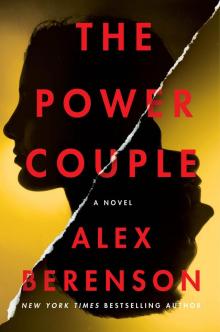 The Power Couple
The Power Couple The Counterfeit Agent
The Counterfeit Agent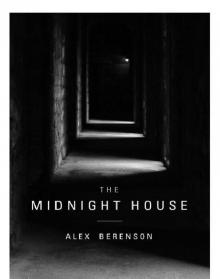 The Midnight House
The Midnight House The Prisoner
The Prisoner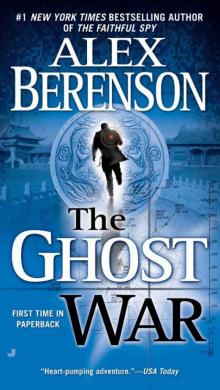 The Ghost War
The Ghost War The Shadow Patrol jw-6
The Shadow Patrol jw-6 The Shadow Patrol
The Shadow Patrol The Deceivers
The Deceivers The Night Ranger jw-7
The Night Ranger jw-7 The Faithful Spy
The Faithful Spy The Prince of Beers (Kindle Single)
The Prince of Beers (Kindle Single)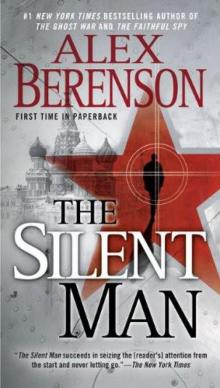 The Silent Man jw-3
The Silent Man jw-3 The Silent Man
The Silent Man The Wolves
The Wolves The Midnight House jw-4
The Midnight House jw-4 The Ghost Agent
The Ghost Agent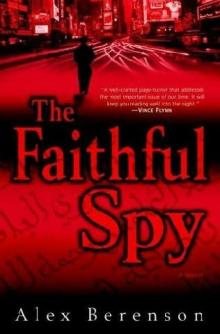 The Faithful Spy jw-1
The Faithful Spy jw-1 The Prince of Beers
The Prince of Beers Twelve Days
Twelve Days The Secret Soldier jw-5
The Secret Soldier jw-5 The Ghost War jw-2
The Ghost War jw-2 The Night Ranger
The Night Ranger